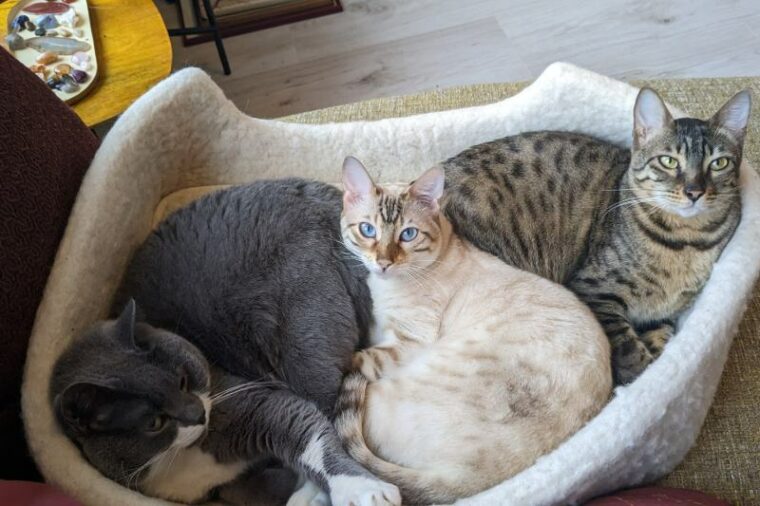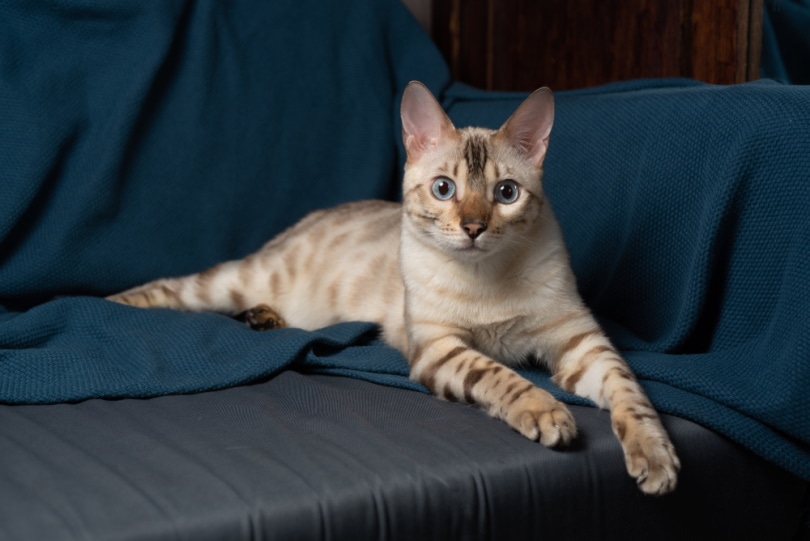
Despite their steep price tags, most owners will quickly attest that their Savannah cats are worth every penny and then some. With their sharp intellects, loyal personalities, and gorgeous forms, who wouldn’t love to share the house with one of these exotic hybrids?
Well, your other pets may not be too keen to start. For the most part, Savannah cats get along well with other cats and dogs. But socialization and a bit of effort on your part will be essential to ensure a positive relationship between your furry friends. And depending on the cat’s pedigree and the other animals in the house, it’s sometimes best not to risk any issues by mixing multiple pets.
Whether you are planning on giving your current Savannah cat a new friend or bringing a Savannah cat into an already cat-occupied house, you’ll need to predict and plan the interactions between your pets. We’ll explain what to expect when you bring a Savannah cat into the mix.
Will a Savannah Cat Get Along With Other Cats?
Savannah cats will usually be friendly and sociable with other domestic cats. The breed is intelligent and active, and having another pet to match its energy level can be highly beneficial. Giving your Savannah cat constant attention and interaction is challenging yet essential in many cases, lest your pet become bored and destructive. With a playmate, you can get relief from entertaining your cat without the threat of it wrecking your home.
Of course, certain variables will determine how well your Savannah cat will get along with other cats in your home, including:
You will also play a significant role in your cats’ relationship. Gentle introductions and monitored interactions will be vital for preventing fighting, as will deciding whether you should pair a particular Savannah cat with another one.

Filial Generation
Understanding your Savannah cat’s filial rating will help you better gauge its relative energy level and the likelihood of getting along with other pets. Savannah cats with F1–F3 ratings are closer to their African Serval relatives than newer generations and will show more aggressive and independent personalities that may not mesh with other cats.
Many Savannah cat state laws restrict ownership to F4 or later generations partially for this reason. These cats are more domestic than wild and are subsequently much easier to train and socialize. Regardless of the generation, you’ll always need a careful, measured approach to introduce your cats.
Cat Breeds
With their wild ancestry, Savannah cats have a substantial amount of spring in their step. They’re quick, agile, and bursting with energy, which you or your other cat will have to match if you want to keep it from its destructive tendencies. High-energy cat breeds that make good housemates for Savannah cats include:
Although an active breed will make playtime better for a Savannah cat and easier on you, any friendly and tolerant cat can make an appropriate buddy.

How to Socialize Your Savannah Cat
Socializing early with any pet will make friendliness and trust second nature to your pet. Getting your Savannah cat used to new people, places, and animals at a young age will make it content with sharing the space and your attention.
Introduce your cats slowly at first under tight supervision. They may not care for each other initially, making short periods together preferable until they become comfortable. Keeping them in separate rooms can allow new cats to exchange scents and slowly explore more of the home before finally meeting other pets.
It can take many weeks for Savannahs and other cats to acclimate. One might feel threatened and potentially act aggressively. Be patient, don’t force interactions, and stay alert to any emergent hostility that may require intervention. Try to create positive associations by offering food or treats during interactions to make them more at ease with one another.
Ensure your house has enough toys and tools to entertain your cats, whether they want to play together or by themselves. Be prepared to give your cats some alone time with their favorite toys.
Are Savannah Cats Good with Other Pets?
Savannah cats can get along with other cats, dogs, and even small children, but their hunter’s instinct has a limited tolerance. Fish, birds, and small animals like mice, rats, and hamsters are more at risk of harm, especially if your cat is closer to an F1 generation. If your pets share a home, keep the room with the rodents off-limits to your cat and seal cages off from any potential access.
Conclusion
Savannah cats are active and outgoing. While they may have a reputation for wild habits, the cats are social with people and pets, often fitting in easily once they become trusting of new surroundings. It will take extra effort to ensure both pets get adequate attention and don’t view the other as competition. Don’t be discouraged by minor spats, and set the best example by staying positive and patient.
Featured Image Credit: Arwen Matthijssen, Shutterstock







